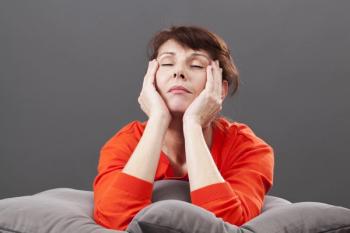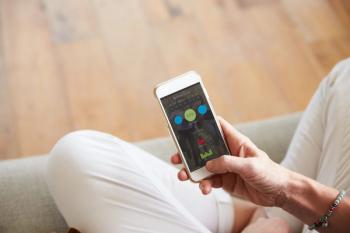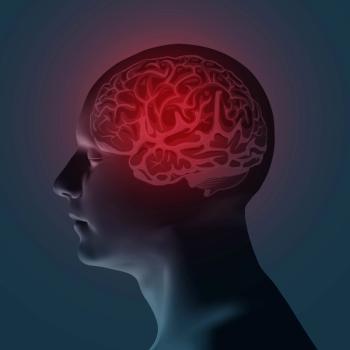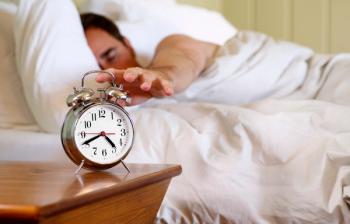
Sleep quality may be as significant as estrogen withdrawal in determining weight gain risk in women, according to a study presented virtually at the Endocrine Society’s 2021 Annual Meeting.

Matthew is an associate editor for The American Journal of Managed Care® (AJMC®). He joined AJMC® in 2019 and creates content for Medical World News®, a 24-hour online program developed MJH Life Sciences® focusing on pressing topics within managed care, as well as the nonwork-related activities of health care stakeholders.
He has a BA in journalism & media studies and economics from Rutgers University. You can connect with Matthew on LinkedIn.

Sleep quality may be as significant as estrogen withdrawal in determining weight gain risk in women, according to a study presented virtually at the Endocrine Society’s 2021 Annual Meeting.

Researchers discuss the current state of digital health for the treatment of Parkinson disease, particularly patient perspectives and specific technological innovations being investigated.

To mark World Sleep Day, a survey issued this week spotlights trends that have impacted sleep quality in the past year, including rising stress amid the COVID-19 pandemic and the prevalence of unattended snoring that may signal an underlying health condition.

Patients with obstructive sleep apnea (OSA) and history of cardiovascular disease treated with continuous positive airway pressure (CPAP) therapy were shown to report 20% higher levels of moderate physical activity compared with non-CPAP users, with these patients also more likely to exercise at levels meeting clinical recommendations.

A novel skin test was shown to detect metabolites that could predict the development of Parkinson disease, as well as delineate changes in lipid processing and mitochondria that can be leveraged to better understand how the disease develops.

Screen usage among adolescent girls was associated with shorter weekday sleep and time in bed, as well as higher body mass index compared with girls reporting no screen time. Nearly two-thirds of girls also reported use of more than 1 screen at a time after school, in the evenings, and on weekends.

Among patients with Parkinson disease, greater risk of frailty was associated with being female and having higher scores on the Movement Disorders Society Unified Parkinson's Disease Rating Scale and Geriatric Depression Scale.

Researchers discuss lifestyle interventions associated with improved outcomes in patients with obstructive sleep apnea, including weight management and alcohol and smoking cessation.

A study finds type 2 diabetes associated with an increased risk of developing Parkinson disease (PD), as well as faster progression of motor symptoms in those with PD.

Citing 2021 as the year of the pharmacist, this year's CVS Health’s Health Trends Report discusses pressing issues for pharmacists to monitor, including availability of COVID-19 vaccines to communities nationwide, as well as integration of telehealth and behavioral health services.

According to an abstract to be presented at the American Academy of Neurology’s 73rd Annual Meeting, gold may be better at improving balance and fall risk among patients with Parkinson disease than Tai Chi. In addition, patients are more likely to continue the golfing exercise.

Patients with obstructive sleep apnea (OSA) exhibited improvements in sleepiness, depressive, and anxiety symptoms after 3 years of continuous positive airway pressure therapy (CPAP) use, although higher adherence to CPAP was linked with weight gain.

An irregular sleeping schedule is associated with a greater risk of depression in the long term, with consequences similar to results seen among persons who sleep fewer hours overall or stay up late most nights.

Merck and Johnson & Johnson (J&J) partner to produce J&J's COVID-19 vaccine; Anthony Fauci, MD, warns against shifting to a single-dose strategy for approved 2-shot vaccines; Medtronic recalls its HVAD Pump Implant Kits.

Among caregivers of patients with Parkinson disease experiencing psychosis, only 11% learned about the symptom from a physician, with communication challenges attributed to having to prioritize other issues in a limited appointment time.

Patients with osteoarthritis-related pain were shown to benefit from cognitive behavioral therapy for insomnia (CBT-I) via telephone, in which the treatment significantly improved sleep and fatigue after 12 months, with pain temporarily relieved as well.

A survey found that 42% of US working adults were more stressed or anxious in the past year about taking a sick day to care for themselves or someone else compared with years past, with 1 sick day currently associated with a $227 earnings loss.

Patients with levodopa-responsive and levodopa-resistant tremors exhibit differing preferences on the type of deep brain stimulation administered to control motor function in Parkinson disease.

Elderly patients who recently had a heart attack and fit the criteria for obstructive sleep apnea were shown to be at greater risk for heart rhythm disorders, such as arrhythmia and coronary artery disease, as well as for major adverse cardiovascular and cerebrovascular events.

Visual dysfunction among patients with Parkinson disease was associated with worse cognitive performance after 18 months and a higher risk of developing mild cognitive impairment compared with those with normal vision.

Older adults who reported getting 5 hours or less of sleep per night exhibited a more than 2-fold increased risk of dementia than those who reported 7 to 8 hours of sleep, with sleep disturbance and deficiency additionally linked with overall risk of death.

An article by Willis Towers Watson discusses how employers are supporting their respective workforce amid the pandemic, with education of approved vaccines and effective communication channels with state and local health departments referenced as key actions to be taken at this time.

Based on positive phase 3 results in adults with idiopathic hypersomnia, Jazz Pharmaceuticals submitted a supplemental new drug application (NDA) to the FDA for Xywav (calcium, magnesium, potassium, and sodium oxybates) oral solution.

Nearly 45% of children who underwent diagnostic polysomnography (PSG) for obstructive sleep-disordered breathing were found to have normal sleep studies, warranting greater consideration of PSG to manage adverse sleep symptoms in children and potentially prevent unnecessary surgery.

Fungi within the gut microbiome were not found to be a contributing factor to the initiation and progression of Parkinson disease, contrary to prior findings.

Humana and IBM Watson Health collaboration to streamline access to accurate information on benefits and health care costs for Humana employer group members, agents, and employers.

The FDA approved a prescription tongue muscle stimulation device that claims to reduce mild sleep apnea and snoring in patients with obstructive sleep apnea.

An Apple Watch designed to remotely monitor fluctuations of resting tremor and dyskinesia in persons with Parkinson disease was shown to match in-clinic evaluations of these symptoms and capture symptom changes in response to treatment for 94% of participants.

Occupational stressors in nurses working during the peak of the coronavirus disease 2019 pandemic in China were found to be significantly correlated with mental health and sleep difficulty.

A survey by Willis Towers Watson found that nearly half of employer onsite and near-site health centers expanded virtual care services during the coronavirus disease 2019 pandemic, including in chronic condition management and behavioral health.

259 Prospect Plains Rd, Bldg H
Cranbury, NJ 08512
© 2025 MJH Life Sciences®
All rights reserved.
